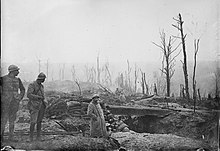Battle of Verdun
| Battle of Verdun | |||||||
|---|---|---|---|---|---|---|---|
| Part of the Western Front of the First World War | |||||||
 A French trench in north-east France | |||||||
| |||||||
| Belligerents | |||||||
|
|
| ||||||
| Commanders and leaders | |||||||
|
|
| ||||||
| Strength | |||||||
| 75 divisions (1,140,000 soldiers) | 50 divisions (1,250,000 soldiers) | ||||||
| Casualties and losses | |||||||
| 542,000.[3]-400,000;[4] 163,000 of those died. | 434,000.[3]-355,000;[4] 143,000 of those died | ||||||
The Battle of Verdun was a battle of the First World War. It started when the German Fifth Army attacked French positions, near Verdun, on February 21, 1916. It ended on December 18 of that year but the front line had not changed very much. Both sides lost about 337,000 soldiers each. Never before was industrialisation so visible in war. They also speak about the Hell of Verdun or the Blood pump. The Battle of Verdun is considered the biggest and longest in world history.
Never before or since has there been such a long battle, involving so many men, fought on such a tiny piece of land. There were many attacks and counterattacks; one small village changed hands 16 times. The battle, which lasted from 21 February 1916 until 19 December 1916, caused over an estimated 700,000 casualties (dead, wounded and missing). About 300,000 died. The battlefield was not even a square ten kilometres. From a strategic point of view, there can be no justification for these terrible losses. The battle lowered into a matter of prestige for the two nations, and started being fought for the sake of fighting and honor, according to German command Paul Von Hindenburg.
The French commander, Marshall Philippe Pétain, used a system of rotation by which every division in France fought for a short time at Verdun. After the battle the landscape was left as one of the worst battlegrounds on all of France, filled with craters of the artillery, the trenches, the odor left by the dead, etc. During the battle the chief of the German General Staff, Erich Von Falkenhayn, was relieved from duty and sent to lead a joint Austrian, German and Bulgarian attack on Romania, leaving Paul Von Hindenburg as Chief of Staff.
References[change | change source]
- ↑ The Encyclopedia Americana, Vol.28, (J.B. Lyon Company, 1920), 283.
- ↑ MacKenzie, Donald A., The story of the Great War, (Buck Press, 2009), 142.
- ↑ 3.0 3.1 Dupuy, 4th Ed.,1052.
- ↑ 4.0 4.1 Grant, 276.
